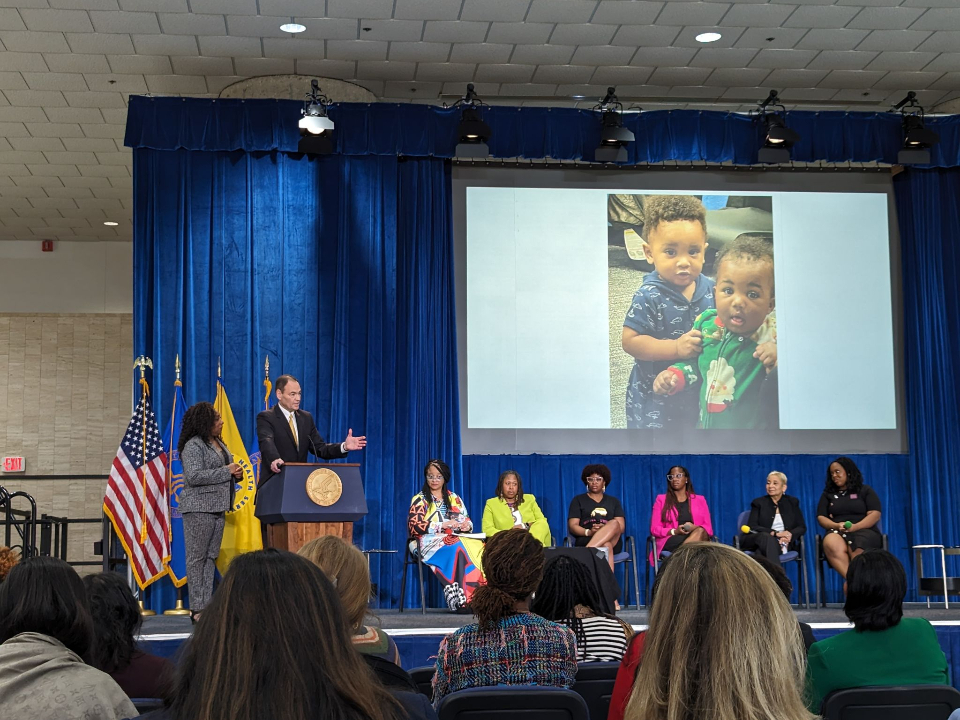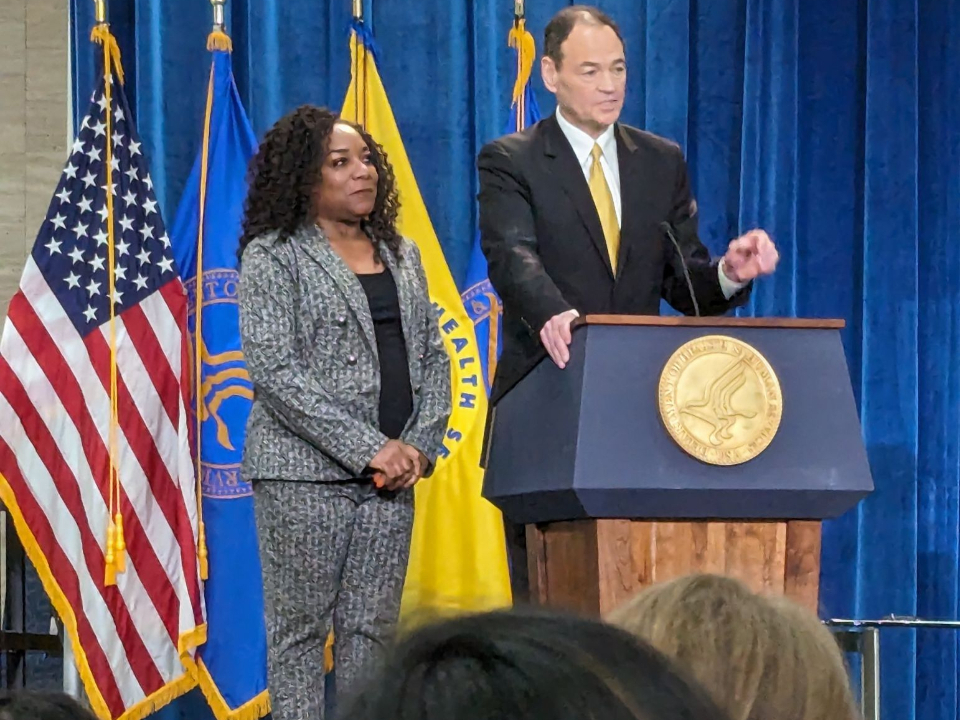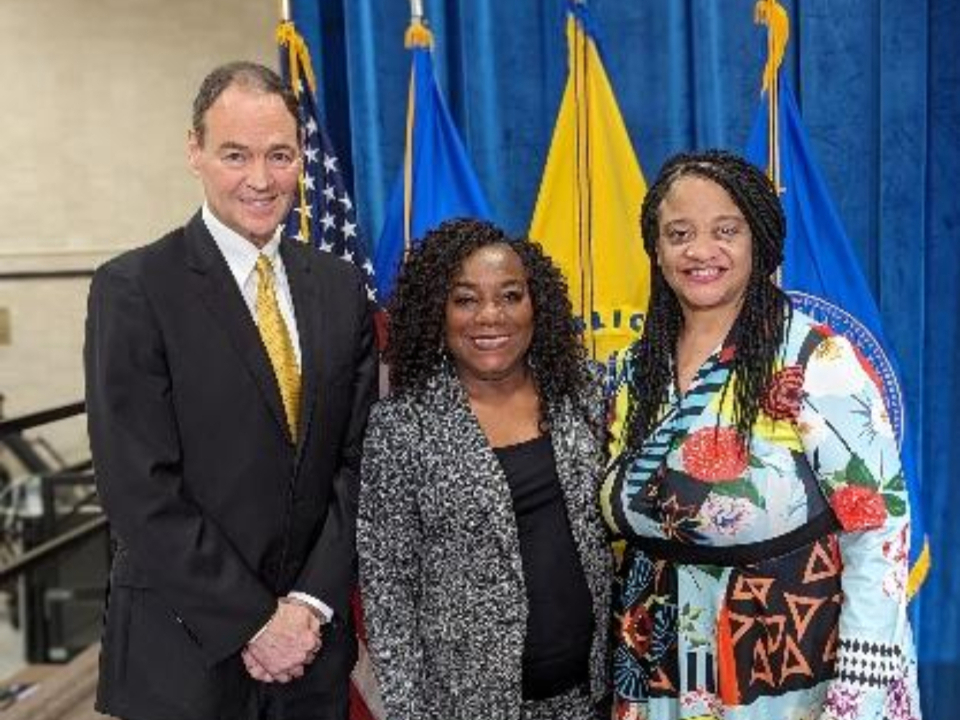
naacp-church-infant-mortality-1.jpg
Vickie Terry, executive director of the Memphis Branch of the NAACP, stands at the podium with and Dr. Michael V. Beheshti of The Church of Jesus Christ of Latter-day Saints' MyBaby4Me initiative, with others seated on a panel during an event in Washington D.C. on April 12, 2024. Photo by Cynthia Clark, courtesy of Church News.All rights reserved.This story appears here courtesy of TheChurchNews.com. It is not for use by other media.
By Cynthia Clark, for the Church News
The U.S. Department of Health and Human Services recognized the role of The Church of Jesus Christ of Latter-day Saints for implementing a program that has reduced infant mortality rates in Black communities.
The director of the department’s program designed to integrate faith-based organizations in health care recognized and praised the Church at a Washington D.C. event on April 12.
As part of the Church’s partnership with the NAACP, Church leaders met with Vickie Terry, executive director of the Memphis Branch of the NAACP, to brainstorm in 2022.
She responded that “it disturbs me that [we] are sitting in a zip-code that has one of the highest infant mortality rates in the country.” Dr. Michael V. Beheshti, then serving as an Area Seventy in the Church’s North America Southeast Area at the meeting and a practicing physician, determined to learn what he could and see how the Church could help.
The Reverend Dr. Que English leads the HHS’s center for faith-based and neighborhood partnerships. At the April 12 event English organized, she highlighted this NAACP-Church partnership emphasizing the role of faith-based organizations.
Searching for Programs to Help on Infant Mortality

naacp-church-infant-mortality-2.jpg
Vickie Terry, executive director of the Memphis Branch of the NAACP and Dr. Michael V. Beheshti, physician and former Area Seventy of The Church of Jesus Christ of Latter-day Saints in the North America Southeast Area, speak at an event in Washington D.C. where the Church was recognized for its MyBaby4Me initiative on April 12, 2024. Photo by Cynthia Clark, courtesy of Church News.All rights reserved.Elder Beheshti reviewed the medical literature finding little helpful information. Accidentally he found a peer reviewed report from The Ohio State University Wexner Medical Center. The report described Moms2B, a community-based program that addressed non-medical determinants of poor infant and maternal mortality in Black populations.
The program, founded by Dr. Patricia Gabbe, had postulated that food insecurity, homelessness, inadequate and unreliable transportation, and the lack of other basic life necessities were risk factors for poor maternal and infant outcomes. Elder Beheshti met with Dr. Gabbe and staff of the Moms2B program who were willing and eager to have their program replicated.
Elder Beheshti recognized the importance of community partners to provide information on health, nutrition, and education, governmental services, and assist with transportation, food and housing. The Church humanitarian program approached Vickie Terry and the NAACP to partner to implement Moms2B in Memphis. The MyBaby4Me initiative was born in Memphis.
HHS Secretary Xavier Becerra and three representatives of the congressional Black Caucus, Robin Kelly (IL-02), Alma Adams (NC-12), and Lauren Underwood (IL-14), all spoke at the conference. They emphasized the importance of community, partnerships and faith-based organizations in efforts to improve Black maternal health.
A panel with representatives of models and practices that could be replicated followed. Dr. Kamilah Dixon, the current medical director of Moms2B, described this program. The program takes women at any stage of pregnancy and continues with them through the first year of their baby’s life. Over several years the program brought the infant mortality rate in Weinland Park, Ohio, (a Columbus neighborhood) from 15/1000 births to 3/1000 births, where the average in the United States is 5.6/1000 births.
This was the only program mentioned by the panelists that documented a decline in infant mortality in a high-risk community. With this success the program now takes place in eight Columbus sites. The program is receiving support from the state government.
Additional Praise for Faith-based Programs
Dr. English’s opening remarks focused the summit on inter-organization collaboration. She emphasized the integral role of faith-based organizations and how they have often actively supported community health initiatives.
Directly following Dr. English, Caryn Marks, the director of strategic partnerships at HHS, discussed recent government actions and funding increases. Over $100 million has now been earmarked for Black maternal health priorities. Marks noted the essential role that partnerships with faith-based organizations like The Church of Jesus Christ of Latter-day Saints play in extending the reach of health services.
A Model for a Faith-based Program

naacp-church-infant-mortality-3.jpg
From left, Dr. Michael V. Beheshti, physician and former Area Seventy of The Church of Jesus Christ of Latter-day Saints in the North America Southeast Area; Vickie Terry, executive director of the Memphis Branch of the NAACP; and the Reverend Dr. Que English of the U.S. Department of Health and Human Services after a panel in Washington D.C. where the Church was recognized for its MyBaby4Me initiative on April 12, 2024. Photo by Cynthia Clark, courtesy of Church News.All rights reserved.After the panel concluded their presentations, Dr. Beheshti demonstrated the results from a partnership with a faith-based organization that provided resources and mobilized a community to address maternal and infant mortality. Working with Terry and the Memphis NAACP, the Church developed the MyBaby4Me initiative in 2022.
Dr. Gabbe and the OSU medical team provided all their documentation and lessons learned for implementation. A senior missionary couple from the Church — a retired pharmacist and a nurse — convened a team of volunteers.
The results over the twelve months of operation are impressive. MyBaby4Me Memphis has served over 30 unique high-risk mothers through 118 formal gatherings. The program has provided over 1,000 individual contacts with these mothers and their children, over 700 meals, 600 grocery bags, and over 500 gift cards to women for gasoline or other necessities.
Volunteers have given over 1,000 rides to expectant or new mothers to physician’s visits, MyBaby4Me classes or other important appointments. Eighteen healthy babies have been delivered in a very high-risk population. Several program-led initiatives have directly preserved life and substantially improved outcomes.
In April of this year, MyBaby4Me Memphis was awarded a $790,000 grant from the Tennessee Strong Families Grant Program to continue serving the underserved maternal and infant populations in Memphis. On February 12, the Church launched its second program, MyBaby4Me Nashville, in cooperation with Catholic Charities of Nashville.
Dr. English concluded the conference lauding community efforts to improve Black maternal health. She expressed a desire that models producing documentable data results be replicated. The MyBaby4Me replication of the OSU Moms2B program stood out as an important contribution to knowledge addressing the high Black infant mortality rate in the U.S.
Copyright 2024 Deseret News Publishing Company.